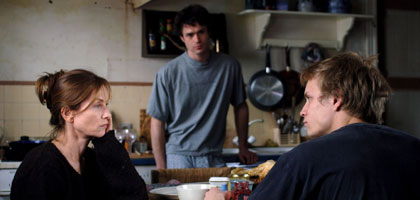Primary navigation


Ginette Vincendeau celebrates an austere family drama that opens a new chapter in Belgian social realism and features a keynote performance by Isabelle Huppert as a mother caught between duty and desire
Belgian film-making over the last decade has enjoyed a remarkable creative renaissance, especially in the area of realist cinema. Following in the footsteps of the Dardenne brothers and Lucas Belvaux, relative newcomer Joachim Lafosse offers in Private Property an impressive low-key family drama, helped in no small part by the presence of Isabelle Huppert in the central role.
Huppert's character is Pascale, a divorced middle-aged mother of twentysomething twins (played by real-life brothers Jérémie Renier, the star of the Dardennes' L'Enfant,and Yannick Renier) who bitterly resent her wanting to start a new life with their Flemish neighbour Jan. Mother and sons are very close - almost too intimate, perhaps, as we see from the way the sons still bath together or Thierry cleans his teeth while Pascale is having a shower, suggesting arrested development rather than incest. Yet they also constantly bicker, as does Pascale with her estranged husband Luc (Patrick Descamps, who appeared in Belvaux's La Raison du plus faible). From this slice of life in which not much 'happens' - until the abrupt ending when an argument between the twins has accidentally tragic consequences - Lafosse has fashioned a compelling film that has all the force of tragedy.
Private Property unfolds in a series of very long and often handheld takes - several of them depicting mealtimes - punctuated by snapshots of almost still life: Pascale in the bath; the brothers playing video games or table tennis. The large and beautiful country house where they live provides the drama's actual and symbolic core. The brothers have been cocooned in a cosy life with their mother: Thierry is an unenthusiastic student and the unemployed François seems to make no effort to find a job, while several scenes show Pascale (who also works outside the home) cooking, cleaning and ironing.
Yet one of the remarkable aspects of Private Property is how skilfully it shows the brothers to be spoiled brats on the one hand while simultaneously making palpable their distress at the prospect of losing both their mother and their home. One scene in particular - when Pascale invites Jan (Kris Cuppens) to dinner to introduce him to her sons - demonstrates Lafosse's talent for enlisting spectator sympathy for all his characters. The audience knows that Jan and Pascale are lovers but the brothers don't, though they react with instant hostility as they sense both the sexual connection and the threat to the status quo Jan represents. Thierry and Jan almost immediately begin a row. Both Jan's attack on the twins' selfishness at not letting their mother move on and Thierry's violent resentment of his pseudo-fatherly authority are shown as equally justified. This is indeed the point at which the film creates tragedy out of a banal domestic melodrama: all four characters have legitimate desires to which there is no possible resolution.
Jan, a chef, has cooked a delicious meal (contrasting with the family's everyday pasta or chicken) but the food remains uneaten, symbolising his rejection from the family circle and boding ill for his future dream of opening a restaurant with Pascale. The brothers' unwillingness to tolerate a stranger in their midst is also the origin of the final drama: when Thierry brings his girlfriend Anne (Raphaëlle Lubansu) home while Pascale is away, she unwittingly provokes a fight between the twins, with tragic consequences.
Unlike the Dardennes and Belvaux, Lafosse makes no comment on Belgium's socio-economic situation. We never learn where the house is situated and François' lack of a job appears as much the result of his apathy as an indication of Belgian unemployment. Similarly the brothers' lampooning of Jan as 'Flemish' plays as hostile banter rather than as an exploration of the difficult relationship between Belgium's ethnic groups.
Private Property does document Pascale's predicament as a woman slaving to support her children but bereft of cash and property of her own. The French title Nue Propriété refers to a legal category signifying that the house is hers to live in but not to sell, since her ex-husband has passed it directly to his sons. In the end, however, this fuels the personal melodrama rather than constituting a political statement about women's lack of rights. And while the film shows the final tragic accident to have been caused by the twins fooling around, it's hard not to read it also as a result of their mother having 'abandoned' them: as in so many Hollywood melodramas of the 1930s and 1940s, a child dies at the point when a mother plucks up the courage to start a new life as a sexual being.
The house itself acts as an economical symbol of Pascale and her sons' fragile equilibrium, poised between the desire to move on and the wish to remain in an artificially prolonged childhood. The final shots, which lead the spectator through the empty rooms and then watch the façade disappear from view through a car window, emphasise the point: only the tragedy of François' death (suggested rather than shown) has forced the characters to leave. While this is a personal rather than a political drama, Private Property uses the stylistic markers of social realism to embed its story in the present. The location shooting, long and mobile takes, absence of music, seemingly improvisational dialogue and lack of make-up for the women all produce a strong sense of immediacy.
Skilful and affecting as Private Property is, it would not have enjoyed festival prizes and international distribution without Isabelle Huppert. And it's hardly a surprise to report that the star of some of the greatest achievements of auteur cinema over the last 30 years is magnificent. But Lafosse must be credited for mobilising her star persona to great effect: her ability to combine charisma with blankness (underlined in several long takes), emotional intensity with coldness, sexual attractiveness with plain looks (few stars of this calibre would accept to be shot with no visible make-up, ordinary clothes and red eyes). While Private Property has none of the sexual 'perversity' that has marked many of her roles, her trademark cold determination perfectly conveys Pascale's ambivalent desire to pursue a new life as a woman rather than give in selflessly to her sons' wishes. A star linked to eminent directors (Godard, Pialat, Chabrol, Chéreau, Ruiz, and so on), Huppert is also known and feted for her willingness to support film-makers at the outset of their careers. Without her, Private Property may not have been made - and for this we must thank her.